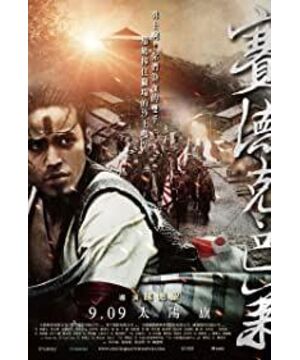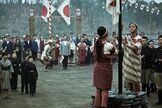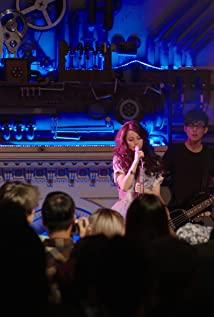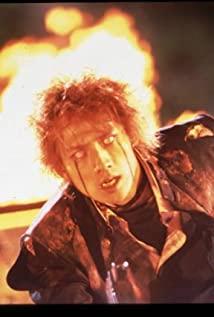In an interview with "Looking at History", Wei Desheng talked about why he chose the "Wushe Incident" in this period of history. One major reason is that such incidents at the time were somewhat "abnormal". As mentioned in the film, Taiwan’s most fierce battle against the Japanese took place after the "Shimonoseki Treaty", a few years after the Japanese had just landed on the island. Although the local Han people and the aborigines were almost abandoned, although it may be for different reasons, Both had a fierce struggle with the Japanese. The film’s portrayal of Mona’s youth is actually very important in the film. It not only shows Mona’s growth and character, but more importantly, this process shows the culture and beliefs of the local tribes, and it also lays the foundation for the film’s style and standpoint. Keynote: There is no deliberate praise or demeanor. It can be seen that the film did not portray Mona into the heroic color of the martial arts as soon as it came up in the history, nor can it praise any evocative deeds. It went from hunting Mona to fighting with other tribes until The tribal wedding was celebrated until he was branded as a warrior under his lips, and the ecology and beliefs of a local culture were naturally displayed. This is a nation in the "barbaric" stage. They praise heroes and have a strong attachment to the land and a sense of borders. The head of the enemy is their pride, and they are eager to pave the way to the Rainbow Bridge with the blood sacrifice of their own battle. This performance is very objective, the original killing and bloodthirsty is very different from many previous "epic movies" that show cultural conflicts. You originally thought this film would show the epic deeds of the Saidiq people resisting the Japanese. , I didn't expect that there were so many "negative" things, including Mo Na's impulse, recklessness, and even bloodthirsty when he was young. However, Wei Desheng cleverly puts his perspective on the perspective of the Sediq people to do a kind of "correction" and balance, because in our current civilization, this kind of tribes have some grudges in the process of commodity trading. The act of fighting and killing with grudge is really backward and cruel. This is a natural and condescending attitude of modern civilization. However, Wei Desheng’s perspective is from the life process of the Seediq people, let you understand why they did this, what reasons they had at the time, give more of the situation at the time, and let the audience judge. It can be said that before the "Fogshe Incident", the outstanding features of this film have been shown in the young Mona stage, and the image of Mona is also lifelike, allowing you to experience the explosion of an unruly soul after decades of being suppressed. origin.
The "abnormal" of the "Fogshe Incident" is that it occurred at a macro level, when the relationship between the locals and the Japanese was eased. The most intense conflict has passed, just as the film skipped several decades after the two Japans. The officials looked at the small town where schools, post offices and other cultural facilities had been established, and smiled satisfied with the results of "enlightenment". The most successful aspect of "Sedek Bale" is the expression of the anxiety of personal identity in this context. Mona has become an elder who seems to be restrained and rationally negotiated with the Japanese to safeguard the interests of the tribe. However, even though Taiwan was already in the stage of demonstrating civilization at that time, the status and cultural contradictions between the aborigines and outsiders still existed. Mona often had to face Bawan's remarks about why he was scolded by Japanese teachers because of his excellence. Puzzled. And the anxiety of this identity is more deeply manifested in the Granada brothers, who are considered to be the outstanding achievements of "education", and the performance of Ichiro Hana is particularly outstanding. As a better than his Japanese counterparts, he still suffers from professional injustices. The treatment was regarded as an exhibit and was generally pointed out by the Japanese as the achievements of colonial education. He has to take the management responsibility to do things for the Japanese, to manage his own people, and at the same time he is often ridiculed by his own people. He is not ashamed. From the contradictory scenes to the outstanding performances of the actors, the audience can experience it. , The pain in the heart of a Sediq with a Japanese surname. He knows the crisis under the prosperity, he knows the murderous spirit hidden in Mona's heart, he knows the end of his compatriots' resistance, and he knows what fate will be brought to him by the conflict between his tribe and the Japanese family. A conversation between Mona and Hanagang Ichiro on the side of a valley stream is a classic bridge of civilization conflicts. Hanaoka Ichiro is puzzled (or actually understands, but in order to persuade Mona to pretend to be puzzled) and asks Mona. Now What's wrong with the life of the people? Everyone still maintains their own way of life. With modern facilities, the children can receive modern education, and they are faced with the powerful armed forces that Mona deeply experienced when he was "visited" to Japan. Mona’s answer is to the point. Facing the so-called modernization, the sentence “is a reminder of our own poverty” can be described as deafening, directly dissecting the so-called “enlightened” superiority from the perspective of the conqueror.
The external harmony often conceals the internal contradictions. After all, the modernization impact that Mona and the others are facing is not based on commercialization methods such as Coca-Cola. They directly face guns and conquests, but indirectly face discrimination. And injustice. Mona is at an awkward node. He has the tradition of the previous generation and directly faces the conquest of modernization. He feels humiliated by the destruction of the tradition and the deprivation of the hunting ground. He is different from those who came into direct contact with modernization. People with "historical burden". For the Japanese, isn’t it? They are people with the "psychological burden" of conquerors and civilized people, and their inherent superiority arises spontaneously, but some people are polite and get along well with the locals; some are rude Violence is the same as that of the local people, and the differences in personality and character combined with this sense of superiority, in the context of cultural conflicts, eventually created serious conflicts. Therefore, that rude "police station" official was just a spark. What he detonated was a gunpowder barrel that had accumulated too much gunpowder, just like the gunpowder that Mona had accumulated through a match head. A little bit each time, after a long time, it was enough. Cause huge destructive power. This kind of destructive power has even been almost out of control. From the perspective of modern civilization, the performance of Mona’s leadership in the "Wushe Incident" can be described as an indiscriminate massacre of innocent people, while Bawan took a group of children and stabbed a group of women and children to death. The scene is even more astounding. Wei Desheng is like this. He does not evade reality. He tells you the reason why the Sediq did this, but he does not deliberately beautify it. For example, it only shows the battle between the Sediq and the military. For the beginning, what a serious vicious circle will be created by the deepening conflict of civilizations, and what a terrible tragedy of lose-lose will erupt. This tragedy was shocking, but it was not the end. It caused a greater tragedy. The Seediq people went to the road of no return. The Japanese firmly established their position as "barbarians". The most typical thing was that they had been friendly with the locals. Because of the hatred of losing their wives, the Japanese military officers in Japan went to the other extreme. The idea of "controlling the barbarians against the barbarians" has caused the conflicts between the local tribes to erupt in a more intense form. However, the starting point of this series of tragedies is hard to say whether it started from the "Wogshe Incident" or from the loss of his father by the young Mona, who was humiliated and conquered. Beginning of the moment.
As far as "Sedek Bale" is concerned, I prefer the upper part, but in the lower part, Wei Desheng has made some tragic and tragic problems while keeping his bystander's perspective slightly towards the side. . It is true that the Sediqs are fighting stubbornly, but they are exaggerated like the Undead Saint Seiya, and they have performed too many battles. It feels that some sections can be omitted completely, just highlighting two or three battles. Of course, these shortcomings are also relatively speaking. In the lower part, we can still experience a kind of immersive cruelty. The scene of the Seediq women voluntarily seeking death so that the soldiers have enough food to fight reminds me of the Japanese movie "Narayama Festival Examination" "From today's point of view, you feel incomprehensible, but this is also a civilized manifestation of that time. Yes, Wei Desheng maintains his own position. I am puzzled that someone accused this film of praising bloodthirsty and barbaric after watching "Sedek Bale". Is there such a way of "praising"? Desperately show the "dark" side of the hero? The whole film makes people feel more of the trauma of civilization and the tragedy of individuals. The people of SurTec expressed their anger and resistance with their civilization at that time, and paid a heavy price. Wei Desheng showed it to the audience. , See those people, those things. Also because of this way of expression, it is also destined to be embarrassed at the box office of its films in the mainland. The film here is good enough, but this way of expression of non-traditional heroism is a bit embarrassing in the market publicity, and Wei Desheng’s serious historical outlook presents another The values of the film are somewhat different from the audience’s understanding. Therefore, mainland audiences have difficulty in substituting that period of history, nor do they have traditional heroes to stir their blood. In addition, the differences in historical understanding and expression methods between the two sides of the Taiwan Strait and China and Japan are doomed. Its box office is sluggish outside Taiwan. Although a group of filmmakers shouted so far, it was obviously not effective. Wei Desheng chose this film language and needed to face some embarrassing controversies and commercial setbacks. However, when the film ended, the subtitles were "Angel Bale". At that time, I could feel the gratification of the people who worked for this film. Wei Desheng has been brewing for twelve years, and he has a good enough sincere work engraved on his resume, which is enough.
http://hi.baidu.com/doglovecat/item/d811c3ebf41d003a87d9de70
View more about Sai de ke · ba lai: Tai yang qi reviews











